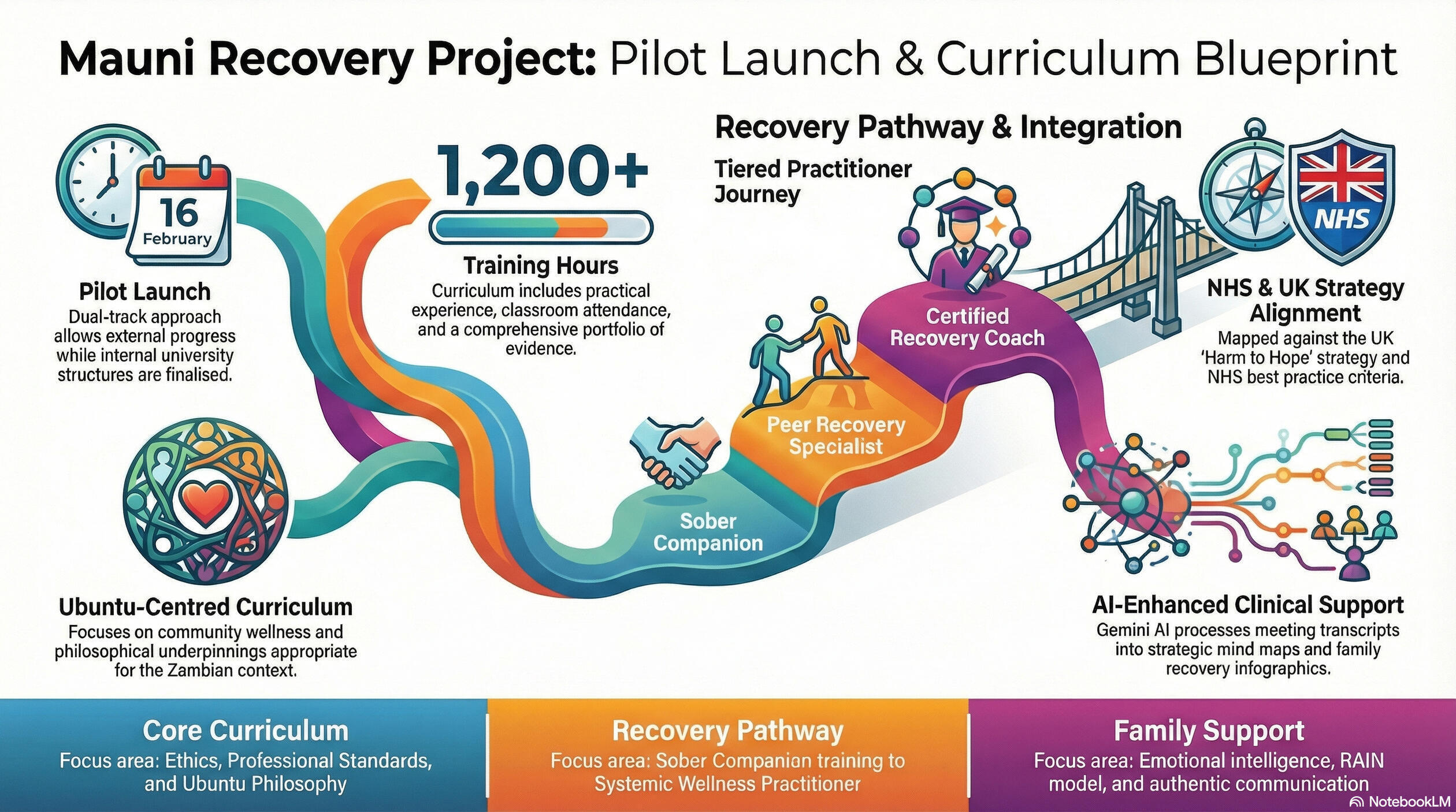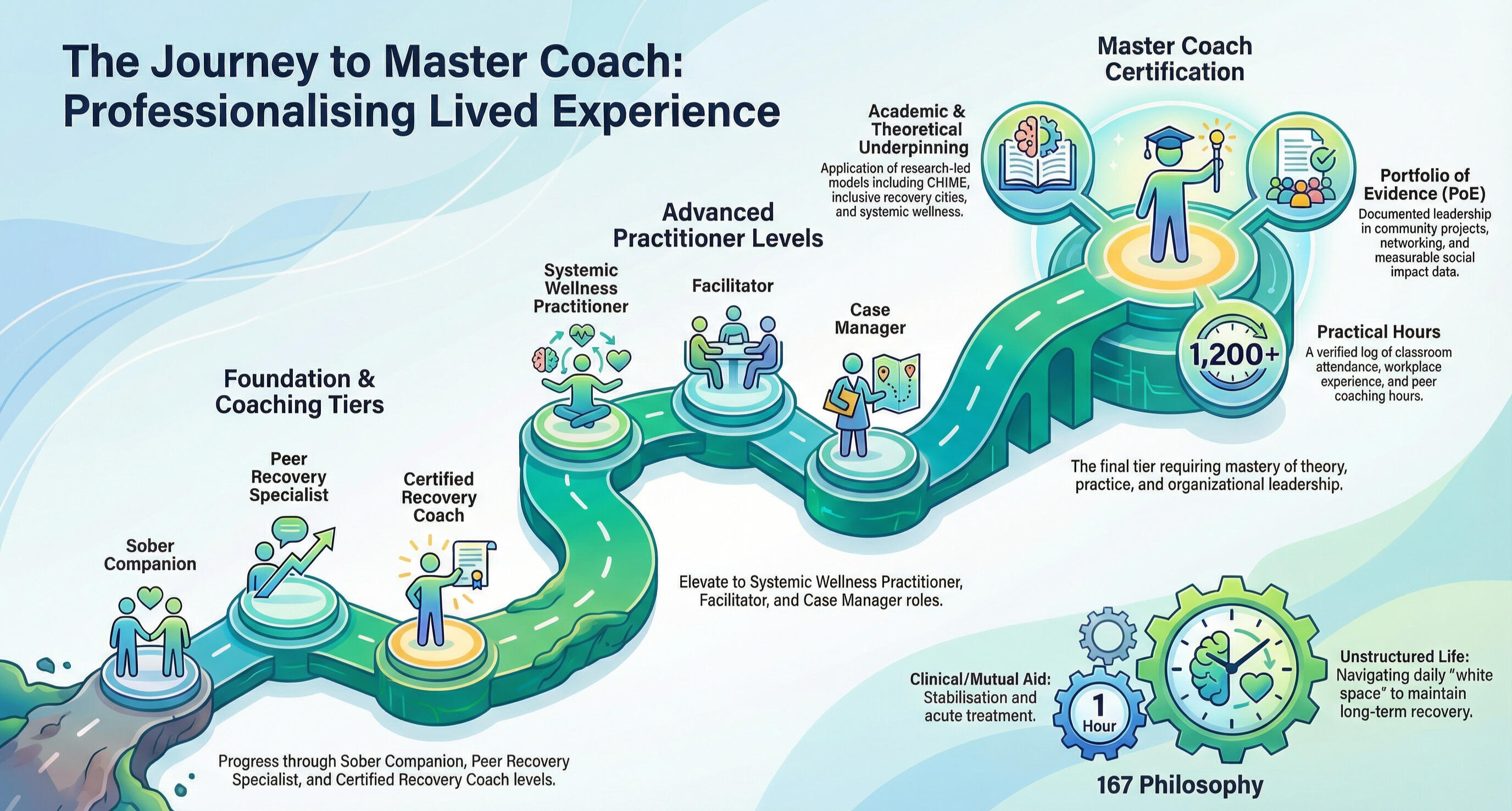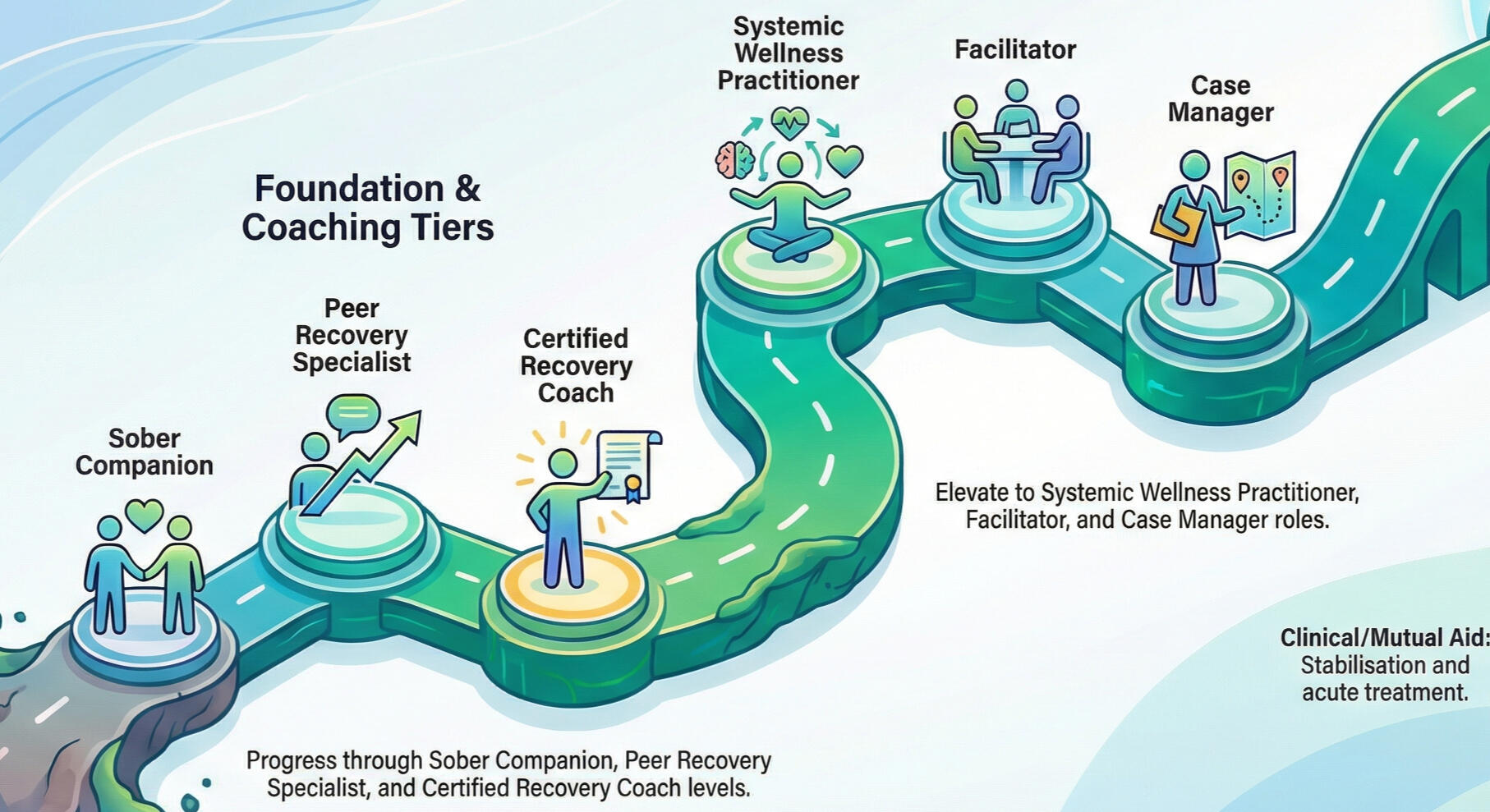U-ACT CiC
Ubuntu Academy Coaching Training
Overview
Since 2015, David Collins and the Mauni/U-ACT team have been actively building Recovery Capital across the UK by training, mentoring, and supporting individuals with lived experience, as well as professionals working within lived experience organisations.Their work centres on empowering people to move from recovery into leadership through systemic coaching, community-building, and capacity development.
U-ACT LERO
Address: Katherine Low Settlement, 108 Battersea High St, London SW11 3HP
Who we work with
Work:
Trained volunteers, peer mentors, ambassadors, and staff across various lived experience settings.
Delivered Recovery Coach Training programmes designed to foster lived experience leadership.
Collaborated with managers and operational leaders to embed a sustainable coaching culture.Focus:
Developing core competencies in Recovery Coaching.
Building organisational recovery capital to support and sustain peer-led services.
Reach out via Social Media
Stay connected. Build recovery leadership.


Portfolio of Evidence
Certified Recovery Coaching Organisations
Our LERO and community partners - UK & Ireland

Certification Path
Click to find out more about our certification path and the individual trainings.
Certified Recovery and Resilience Programme
To find out about our recovery and resilience trainings, click above.
What We're Building in Web3
We are developing a Web3-based immersive recovery platform in the metaverse, combining AI, avatars, and therapeutic environments. Through interactive AI chatbots and guided, avatar-led sessions, we offer experiential and culturally sensitive recovery coaching rooted in immersive therapy models.This is more than just technology—it’s about creating safe, supportive virtual spaces where individuals can heal, grow, and reconnect with themselves and their communities.
To find our more
UK CAMPUS - Online Time Table
| Day | Training |
|---|---|
| Tuesday | 10am UK - LERO Community Of Practice |
| Wednesday | 9am UK - CPRC Certification Path |
| Thursday | 10am UK - LERO Peer Recovery Specialist |
| Thursday | 2pm UK - LERO Systemic Wellness |
| Friday | 12pm UK - Case Management |
African CAMPUS - Online Time Table
| Day | Training |
|---|---|
| Mon - Sun | 8am - SAST 7am UK Daily Community Check-in |
| Tuesday | 9am UK - Own your mind |
| Thursday | 1pm UK - Leadership Development Coaching |
Our Mission:
U-ACT is a Section 18(A) Trust and Non-Profit Organisation dedicated to supporting individuals, families, communities, and organisations through holistic and sustainable mental health recovery. We aim to empower individuals and promote resilience by providing accessible training and empowerment programmes designed to foster long-term well-being.
What We Do:
Training & Empowerment: We offer programs to educate and empower communities in understanding mental health.
Community Support: We work closely with families and organisations to build resilient, healthy communities.
Our Registration & Financial Details:
South Africa PBO
Registered as Ubuntu Community Trust (U-ACT), Section 18A Trust IT 9717/07
Public Benefit Organisation: 930/037/894
Non-Profit Organisation Number: 243-605
Banking Details: Standard Bank, Account Number 00 008 869 2
Branch Code: 051001
SWIFT Code: SBZAJJ
About Us | UACT - Transforming Communities Through Innovative Coaching
Pioneering Sustainable Community Growth with the Spirit of Ubuntu
At U-ACT, we believe that true transformation begins within communities when shared knowledge, compassion, and collective action come together. Guided by the African philosophy of Ubuntu — “I am because we are” — our mission is to empower emerging professionals and organisations committed to youth development and community resilience through innovative, skills-based coaching.
Our Training Programms
Our training programmes are designed to meet the needs of a rapidly evolving marketplace, harnessing cutting-edge technology and evidence-based practices to promote sustainable growth, social equity, and personal mastery.
A Vision for the future
A Vision for the Future: Community-Centric, Tech-Enhanced Learning
In a world where traditional models such as SMART Recovery and CBT are increasingly viewed as outdated, U-ACT sets itself apart by integrating contemporary scientific insights from leading thinkers including William White, David Best, Dr David Patton, and our own Executive Recovery Coach, David Collins. Their most recent research highlights that modern, sustainable coaching skills—anchored in resilience, community, and personal empowerment—are vital to shaping the future of both personal and professional development.
We stand at the forefront
We stand at the forefront of this evolution, leveraging technology to bridge gaps, reach underserved communities, and cultivate an ecosystem of lifelong learners dedicated to social impact.
Our Approach
Our Approach: Beyond Conventional Models
Community Ecosystem Focus: We recognise that lasting change is grounded in community-led initiatives. Our programmes nurture environments where emerging leaders can flourish, collaborate, and uplift those around them.
Beyond Outdated Frameworks:
Moving beyond traditional approaches such as CBT and SMART Recovery, our methods incorporate dynamic, evidence-based techniques aligned with the latest research to develop adaptable and resilient skills sets.
Why Choose UACT?
Community & Ecosystem:
Unlike stand-alone programmes, our ecosystem nurtures collaboration, mentorship, and shared responsibility—embodying the spirit of Ubuntu.Innovative & Evidence-Based:
Our approach integrates the latest research with real-world practice, offering flexible, forward-thinking solutions that empower individuals and communities alike.
Innovative & Tech-Driven:
By leveraging the latest digital tools, virtual learning platforms, and real-world application, we equip professionals to navigate and positively influence an increasingly interconnected world.
Methods:
We go beyond conventional approaches, integrating the latest research and technologies to ensure both relevance and meaningful impact.Local & Global Impact:
Our training is grounded in local realities, yet designed to meet international standards, making it both accessible and applicable across emerging markets worldwide.
Aligning with Global & Local Goals:
Our work directly supports the WHO Sustainable Development Goals (SDGs), particularly:
SDG 3: Good Health and Well-being
SDG 4: Quality Education
SDG 10: Reduced InequalitiesThrough our training, we aim to equip professionals with the skills to foster mental well-being, social inclusion, and community empowerment—driving sustainable development and resilience at grassroots level.
Join Us on this Transformative Journey
Are you an emerging professional or organisation committed to creating meaningful impact? Discover how our innovative training can elevate your potential—and empower the communities you serve.
Visit
Visit https://uact.org.za for more information, or get in touch with us via our contact page: https://uact.org.za/contact.
Together, through the philosophy of Ubuntu, we can build resilient, sustainable communities—empowered from within.
Global alignment
Alignment of GOV.UK Recovery Document with U-ACT, David Collins’ Recovery Work, WHO Development Goals, and South African Context
The GOV.UK Recovery Framework outlines a recovery-orientated system of care that places strong emphasis on peer support and lived experience-led initiatives. This analysis explores how U-ACT and the recovery work of David Collins align with this framework, demonstrating coherence with the United Kingdom’s first-world standards and international best practice.It further illustrates how these initiatives support the World Health Organization’s Sustainable Development Goals (SDGs)—notably SDG 3: Good Health and Well-being—while maintaining critical relevance in the South African context, where structural inequality and limited access to healthcare continue to shape recovery pathways.
1. Recovery-Orientated Systems of Care (ROSC)
Alignment with U-ACT and David Collins:
U-ACT’s Recovery Wellness Coaching Programme is well aligned with the Recovery-Orientated System of Care (ROSC) model, promoting systemic wellness at individual, family, and organisational levels. The programme educates and empowers communities to support recovery from substance use and mental health challenges through client-centred group and one-to-one sessions—reflecting the UK’s collaborative ethos and the WHO’s emphasis on community-based mental health interventions.In South Africa, U-ACT’s work is locally grounded, training recovery coaches to serve in under-resourced communities. This bridges critical gaps in healthcare access and directly supports the equity objectives of SDG 3: Good Health and Well-being.
Executive Recovery Wellness
David Collins’ Executive Recovery Wellness Programme targets high-net-worth individuals and leaders, offering tailored online coaching, live group classes, and evidence-based techniques. This mirrors the UK’s person-centred ROSC focus and WHO’s emphasis on personalised mental health care. In South Africa, Collins’ approach adapts to the context by addressing the unique pressures faced by affluent individuals, such as stigma in professional settings, while contributing to broader community resilience through family psycho-education, a key ROSC and SDG 3 component.
Both U-ACT and Collins build resilient networks, with U-ACT’s global training of recovery coaches and Collins’ focus on community integration aligning with the UK’s best practices, WHO’s community empowerment goals, and South Africa’s need for scalable, grassroots recovery systems.
2. Role of Peer Support
The GOV.UK document underscores peer support as vital for recovery, noting that peers with lived experience bridge power imbalances, foster hope, and reduce stigma at all recovery stages. This reflects UK best practices, integrating peer support into formal healthcare systems. WHO’s SDG 3 promotes peer-driven mental health interventions to enhance access and reduce disparities. In South Africa, peer support is critical due to limited mental health professionals, making community-led initiatives essential.
Alignment with U-ACT and David Collins:
U-ACT’s certified Recovery Coach Training equips participants to provide peer-driven mentoring, leveraging lived experience to empower clients. Its culturally adaptive, evidence-based practices align with the UK’s emphasis on overcoming power imbalances and WHO’s focus on accessible mental health support. In South Africa, U-ACT’s peer support framework addresses cultural and linguistic diversity, reducing stigma in marginalized communities and supporting SDG 3’s inclusivity goals.
David Collins, a Master Coach with over 20 years of experience, uses his lived and professional expertise to guide clients through one-on-one and group coaching in his Executive Recovery Wellness Programme. This aligns with the UK’s peer support model and WHO’s emphasis on visible recovery leadership. In South Africa, Collins’ work destigmatizes addiction among high-profile individuals, fostering hope and community connection in a context where stigma often deters help-seeking.
Both U-ACT and Collins create mutual benefits, empowering coaches and clients, which strengthens community resilience in line with UK standards, WHO’s empowerment objectives, and South Africa’s need for sustainable peer networks.
3. Lived Experience Initiatives
The GOV.UK document highlights the value of lived experience initiatives, such as Lived Experience Recovery Organisations (LEROs), which are peer-led and community-driven. It emphasizes integrating these into broader systems and valuing lived experience alongside learned expertise, a hallmark of UK’s progressive recovery policy. WHO’s SDG 3 supports community-led initiatives to enhance mental health access globally. In South Africa, lived experience initiatives are vital for addressing systemic barriers like poverty and stigma.
Alignment with U-ACT and David Collins:
U-ACT operates as a Community Interest Corporation in the UK and a Public Benefit Organisation in South Africa, functioning as a LERO equivalent. Its peer-led, community-focused mission to train recovery coaches globally aligns with the UK’s vision of independent, systemic change and WHO’s community-driven health goals. In South Africa, U-ACT’s work uplifts underserved communities, combatting addiction and aligning with SDG 3’s focus on reducing health inequities.
David Collins leverages his lived experience to lead U-ACT and deliver his Executive Recovery Wellness Programme. His public-facing initiatives, like the Ubuntu Academy of Coaching Training, destigmatize addiction and train coaches for diverse communities, reflecting UK’s cultural competence standards and WHO’s inclusivity principles. In South Africa, Collins’ tailored coaching meets the needs of diverse clients, enhancing accessibility in a context of cultural and economic diversity.
4. Challenges and Opportunities in Peer Support Roles
The GOV.UK document identifies challenges for peer support workers, including unclear job descriptions, stigma, emotional strain, and limited career pathways, advocating better training and supervision. This reflects the UK’s commitment to professionalizing peer roles. WHO’s SDG 3 emphasizes capacity-building for mental health workers to ensure sustainability. In South Africa, these challenges are amplified by resource shortages and social stigma, requiring structured support systems.
Alignment with U-ACT and David Collins:
U-ACT’s CPD-certified Recovery Coach Training addresses these challenges by offering clear role definitions, evidence-based tools, and internationally recognized certifications (e.g., CCAR, NAADAC). This professionalizes peer roles, aligning with UK best practices and WHO’s capacity-building goals. In South Africa, U-ACT’s training mitigates stigma and role ambiguity, empowering coaches to operate effectively in resource-constrained settings.
David Collins’ programmes provide practical field experience, assignments, and ongoing mentorship through his Executive Recovery Wellness Programme, equipping coaches to handle emotional strain and maintain boundaries. His focus on global certification supports career pathways, aligning with the UK’s development models and WHO’s sustainability objectives. In South Africa, Collins’ supervision and support systems help coaches navigate triggers and stigma, enhancing peer role sustainability.
5. Evidence-Based and Community-Driven Approaches
The GOV.UK document cites research (e.g., Stack et al., 2022) supporting peer support’s effectiveness and encourages recovery community centres (RCCs) to provide meaningful activities and reduce stigma. This reflects the UK’s evidence-based policy approach. WHO’s SDG 3 promotes scientifically grounded mental health interventions. In South Africa, community-driven approaches are essential for scaling recovery efforts amid limited infrastructure.
Alignment with U-ACT and David Collins:
U-ACT integrates neuroscience, spiritual principles, and community-building into its coaching, aligning with the UK’s evidence-based standards and WHO’s focus on holistic interventions. Its global reach across 27 countries and initiatives like recovery cafes mirror the UK’s RCC vision and SDG 3’s community engagement goals. In South Africa, U-ACT’s community-focused approach reduces stigma and provides meaningful activities in underserved areas.
David Collins employs evidence-based techniques like the SCARF model in his Executive Recovery Wellness Programme, reflecting UK and WHO standards. His public-facing initiatives, such as social enterprises, create visible recovery opportunities, aligning with RCC principles and SDG 3’s destigmatization goals. In South Africa, Collins’ work fosters hope and empowerment, addressing local needs for community-driven recovery.
U-ACT and David Collins’ recovery initiatives align closely with the GOV.UK document’s principles, embodying the UK’s first-world approach through collaborative, evidence-based, and person-centred systems. Their work supports WHO’s SDG 3 by promoting accessible, inclusive mental health interventions and community empowerment. In the South African context, their culturally adaptive, peer-led approaches address systemic challenges like stigma, inequality, and resource constraints, contributing to a global movement for sustainable recovery and wellness.